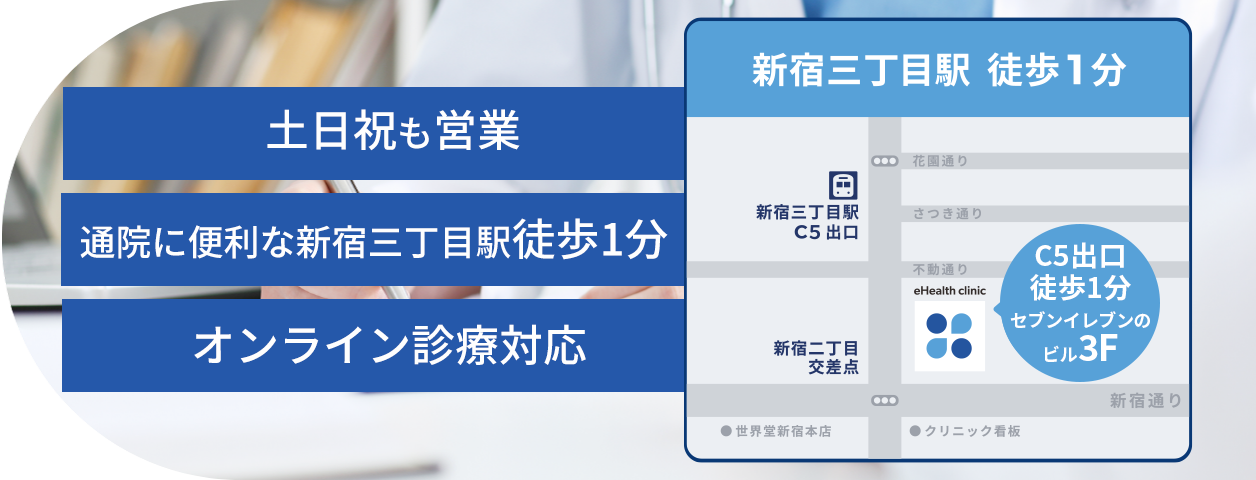NAD⁺点滴療法


Painful urination refers to the discomfort felt in the bladder or urethral opening during urination. The causes can vary depending on gender and the timing of the pain, but inflammation in the urethra or bladder is commonly involved.
Painful urination and other urinary troubles are common symptoms, but if left untreated, they can lead to urinary difficulties, transmission of pathogens to partners, or even life-threatening conditions. Therefore, if you have concerning symptoms, it is advisable to consider visiting a urology clinic or a relevant healthcare professional without delay.
At our clinic, for individuals experiencing symptoms like painful urination, various examinations may be necessary, so we request that first-time patients visit the clinic in person. For follow-up consultations, online consultations are also available upon request.
■Reservation fee 5,500 yen (tax included)
Reservation fee will be charged when you make a reservation. If you change your reservation within 3 business days of the reservation date, you will not be charged a new reservation fee.
Please note that cancellations are generally not refundable.
※Reservation fee is charged only when you make a reservation through the dedicated reservation form.
※Reservation time is only an estimate and may vary depending on other patients’ treatments, such as emergency response and urgent response.
※If you cancel a self-pay treatment reservation made through the dedicated reservation form on the day of the reservation, a cancellation fee of 100% of the cost will be charged.
If you experience painful urination, it is likely related to diseases causing inflammation in the urethra or bladder. The details are as follows:
The most probable disease when experiencing painful urination is “acute cystitis.”
Acute cystitis is a condition where bacteria infect the bladder, leading to
inflammation. It is more common in women and can manifest symptoms such as pain towards the end of urination, frequent urination, and blood in the urine.
The treatment typically involves prescribing antibiotics to kill the bacteria. It is said to take a few days for complete recovery with the use of medication. However, if there are symptoms such as high fever, fatigue, or back pain, it may indicate a possible concurrent condition called “pyelonephritis,” where the inflammation extends to the kidneys. In severe cases, hospitalization and intravenous administration of antibiotics may be necessary. Pyelonephritis can be a life-threatening condition, so caution is required.
Prostatitis is a condition characterized by inflammation of the prostate gland, which is a male-specific organ. There are two main types: bacterial prostatitis, which is caused by bacteria, and non-bacterial prostatitis, the cause of which is unknown. Symptoms may include not only painful urination but also frequent urination, discomfort or pain in the lower abdomen or perineal area. Bacterial prostatitis can be accompanied by fever and fatigue. If left untreated, it can develop into chronic prostatitis, making early medical consultation necessary.
The treatment typically involves administering antibiotics by injection.
Urethritis refers to inflammation of the urethra, which occurs due to bacterial infection or injury to the urethral mucosa. It is often associated with sexual activity, and particularly when there is pain at the beginning of urination, it is said to have a possibility of being a sexually transmitted infection. In addition to painful urination, symptoms such as frequent urination, cloudy urine with yellow or white discharge, and redness and swelling at the urinary meatus may occur, although some women may not experience noticeable symptoms.
If left untreated, it can lead to urethral stricture, where the urethra becomes narrow or closed, causing difficulty in urination. Therefore, it is advisable to seek early medical attention.
The treatment mainly involves the use of antibiotics.
Urethral calculus refers to the condition where a stone forms in the urethra. In addition to painful urination, it is common to experience sudden and intense pain in the side or back around the flank area, as well as the presence of blood in the urine. Other symptoms may include abdominal distension, pain, persistent urge to urinate, and interrupted urine flow. If high fever is present, there may be a suspicion of concomitant pyelonephritis.
For small ureteral stones, it is often recommended to increase fluid intake and engage in physical activity to naturally facilitate their passage through urine. However, in cases where it is difficult for the stones to be expelled through urine or if the ureteral stones are large, treatment options such as surgical removal or shock wave therapy to break up the stones may be considered.
Bladder cancer refers to the collective term for cancer that develops in the bladder. In addition to painful urination, symptoms such as hematuria (blood in urine), frequent urination, urgency, and a feeling of incomplete voiding may occur. As the cancer progresses, it can lead to difficulty in urination, as well as pain in the side, waist, back, and swelling in the legs.
Treatment options include surgery, drug therapy, and radiation therapy, which are chosen based on the condition of the cancer.
For each treatment option, our clinic collaborates with affiliated medical institutions to provide comprehensive care.
In the case of urethral stones, it is advisable to avoid alcohol and irritants as they can trigger symptoms such as pain. Additionally, purines found in alcohol can be a cause of urethral stones, so reducing alcohol consumption is recommended for prevention of recurrence and treatment.
Prostatitis, which can be a cause of painful urination, has two types: bacterial and non-bacterial. In the case of non-bacterial prostatitis, stress can worsen symptoms and contribute to recurrence. Therefore, it is important to avoid accumulating stress.
Acute cystitis, which is considered a major cause of painful urination, can be influenced by lifestyle habits. For example, inadequate fluid intake, holding urine, experiencing diarrhea or constipation, among others, can contribute to its development. Therefore, it is important to be conscious of drinking an adequate amount of water and not holding in urine, and to review lifestyle habits.
Although painful urination is often attributed to common urinary issues, there is a possibility that it may be caused by a serious underlying condition. Therefore, if you experience severe pain or if the pain persists for an extended period, or if you have other concerning symptoms, it is advisable to seek medical attention without delay.
In our clinic, various examinations may be necessary for individuals experiencing symptoms such as painful urination, so we kindly request that initial consultations be conducted in person. For follow-up visits, online consultations are also available upon request.

■Reservation fee 5,500 yen (tax included)
Reservation fee will be charged when you make a reservation. If you change your reservation within 3 business days of the reservation date, you will not be charged a new reservation fee.
Please note that cancellations are generally not refundable.
※Reservation fee is charged only when you make a reservation through the dedicated reservation form.
※Reservation time is only an estimate and may vary depending on other patients’ treatments, such as emergency response and urgent response.
※If you cancel a self-pay treatment reservation made through the dedicated reservation form on the day of the reservation, a cancellation fee of 100% of the cost will be charged.
【1 minute walk from Shinjuku Sanchome Exit C5】
Director speaks English and Chinese. Available on Saturdays, Sundays, and national holidays. Open until 20:00 on weekdays. 24-hour web reservations available.Internal medicine, nephrology, allergology, urology.
Address: Shinjuku Dori Toyo Bldg. 3F, 2-6-4 Shinjuku, Shinjuku-ku, Tokyo 160-0022, Japan
・1 minute walk from Shinjuku Sanchome Station (Exit C5) on Tokyo Metro Marunouchi Line, Tokyo Metro Fukutoshin Line and Toei Subway Shinjuku Line
・7 minutes walk from Southeast Exit of JR Shinjuku Station
・5-minute walk from Shinjuku-Gyoenmae Station (Exit 2) on Tokyo Metro Marunouchi Line
If you have any questions, please don’t hesitate to let me know.
Email:contact@ehealthclinic.jp

Hoichi Amano (M.D.,PhD)
・Administrator of eHealth clinic
・Visiting lecturer (School of Public Health,Teikyo University)
・Locum Doctor (Teikyo University Chiba Medical Center)
・Occupational health physician for several companies
• Education
2018 – 2021 Doctorate in Public Health, Teikyo University Graduate School of Public Health, Tokyo, Japan
2016-2018 Master’s Degree in Public Health, Teikyo University Graduate School of Public Health, Tokyo, Japan
2004-2010 M.D., Saitama Medical University, Faculty of Medicine, Saitama, Japan
• Certifications
Board Certified Member of the Japanese Society of Internal Medicine
Board Certified Nephrologist of the Japanese Society of Nephrology
Board Certified Member of the Japanese Society of Anti-Aging Medicine
Occupational Medicine Physician
Master of Public health
Doctor of Public health
If you have any questions or concerns, please feel free to contact us here.(We will respond during business hours.)
https://ehealthclinic.jp/contact/
■Reservation fee 5,500 yen (tax included)
Reservation fee will be charged when you make a reservation. If you change your reservation within 3 business days of the reservation date, you will not be charged a new reservation fee.
Please note that cancellations are generally not refundable.
※Reservation fee is charged only when you make a reservation through the dedicated reservation form.
※Reservation time is only an estimate and may vary depending on other patients’ treatments, such as emergency response and urgent response.
※If you cancel a self-pay treatment reservation made through the dedicated reservation form on the day of the reservation, a cancellation fee of 100% of the cost will be charged.